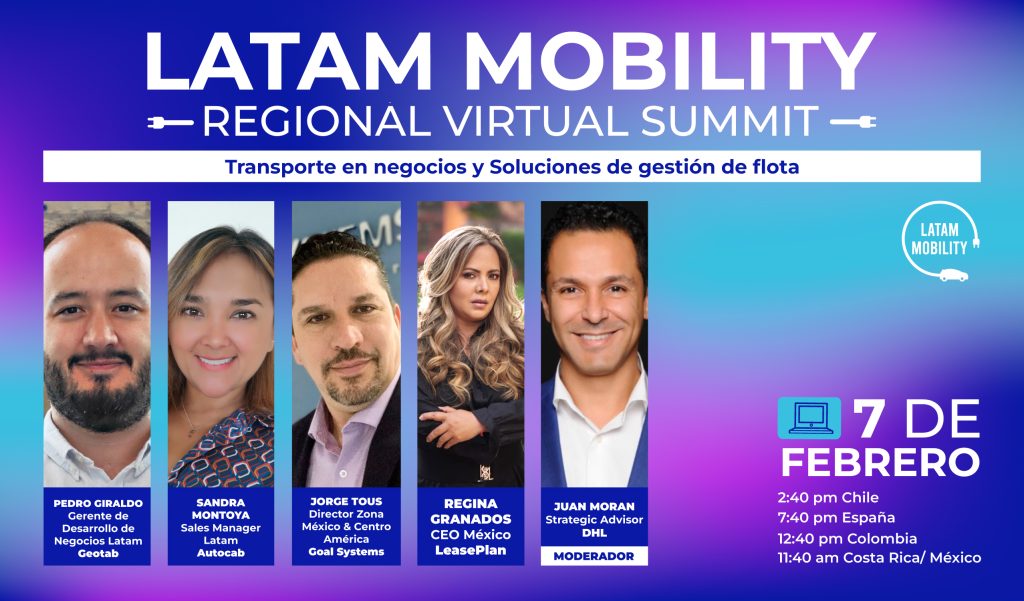
Geotab, Autocab, LeasePlan and Goal Systems Showed Advances on Business Transportation and Fleet Management Solutions

The optimal management of vehicles is a fundamental part for companies to carry out their operations in compliance with the climate challenges with the reduction of emissions, and also to reduce costs in their activities.
In this sense, the “Latam Mobility: Regional Summit 2023” was the forum for distinguished companies in the field of mobility to offer their points of view on “Business Transportation and Fleet Management Solutions”.
According to Pedro Giraldo, Geotab‘s Business Development Manager for Latin America, less than 50% of companies carry out processes to measure the activity of their fleets, so there are many challenges for the transition to sustainable mobility.
He highlighted that the company reached the figure of more than 200,000 connected vehicles in the region, which have sustainable tools that allow organizations to measure their emissions, track, establish programs, compare themselves to leading fleets in the market and take advantage of the amount of data for evaluations and studies in their own fleet.
Giraldo pointed out that there are still challenges to overcome in Latin America, especially in the public sector. He also indicated that another important challenge is to educate clients about the great benefits that telematics generates with their data.
Related content: AVL, Link Electric Vehicles, Reborn Electric Motors and Vitesco Technologies Discuss Electric Vehicle Technology Advances in Latin America
Autocab’s Software
Sandra Montoya, Sales Manager Latam of Autocab, highlighted the technological advances of the company that currently registers 1,500 vehicles connected through Software as a Service (SaaS) and generating synergies between operators to be sustainable.
“It is of great importance to capitalize on data and come up with a value proposition that involves other transportation service providers integrating solutions, seeing cities as a whole,” explained the Autocab executive during the Latam Mobility virtual forum.
She assured that the innovations presented by the company allow operators to gain logistic efficiency, savings and emissions reduction.
She considers it essential for the public sector to implement incentives and initiatives in cities so that transportation can make the transition.
Likewise, Montoya pointed out that electric mobility faces challenges such as charging infrastructure that, with the will and joint work among the actors involved, will be able to reach a successful conclusion.

More Efficiency
Jorge Tous, Mexico & Central America Area Director of Goal Systems, detailed the range of solutions presented by the Spanish company for the optimization of transportation operations, including trains and railroads.
“We help companies to improve their services, be more efficient, reduce costs, be sustainable, make better decisions and plan”, he said.
He stressed that they have offices in Bogota, Rio de Janeiro, Sao Paulo, Santiago de Chile and Mexico City because of the great potential they see in Latin America to boost sustainable mobility.
Tous highlighted that they work with Bogotá’s Transmilenio, Santiago’s public transport and are starting a large-scale project in Sao Paulo.
“We seek to program the public transport units with their peak hours so that the buses are not traveling empty or together with few passengers each, because it generates emissions and does not optimize mobility in the city”, pointed out the Goal Systems executive.
Tailor-made Solutions with LeasePlan
The “Latam Mobility: Regional Summit 2023” also counted with the distinguished participation of the company of Dutch origin, LeasePlan, through its CEO in Mexico, Regina Granados.
The company has been offering efficient and technological solutions for the management and leasing of cars for more than 60 years to clients from all industries, with the objective of providing them with mobility, maintenance and everything they need in the framework of their operations.
Granados detailed that one of the goals is to lead the transition to electric or hybrid fleets, advising companies to realize the great benefits generated by zero-emission vehicles.
“We give consultancy to see which models they could use. It is still a challenge to have the necessary infrastructure to operate with electrified cars, since areas such as delivery need to be developed in that sense, and we offer particular strategies, customized according to the budget they have,” he explained.
He assured that they work together with a wide network of suppliers that are fundamental to offer solutions and show monitoring results such as accident rate and fleet change, which allows analyzing availability and being able to add many actors such as workshops and agencies specialized in mobility.
“The goal is to take care of your fleet and your money, which is why we propose comprehensive solutions to make operations more efficient,” Granados concluded.





